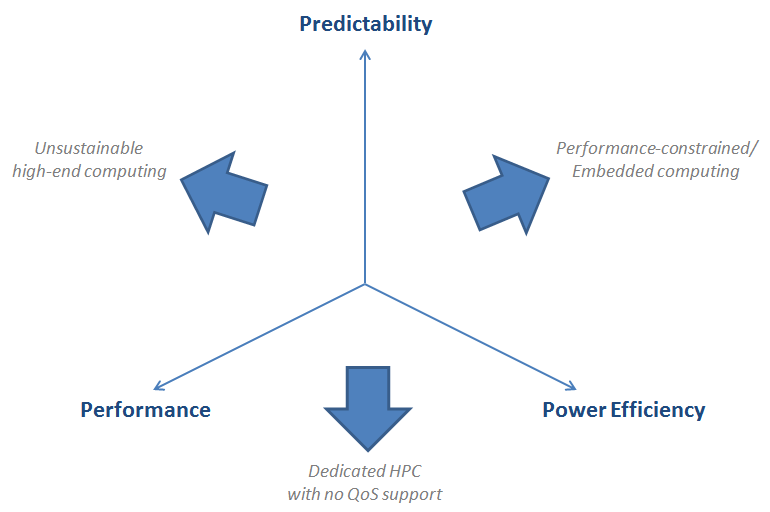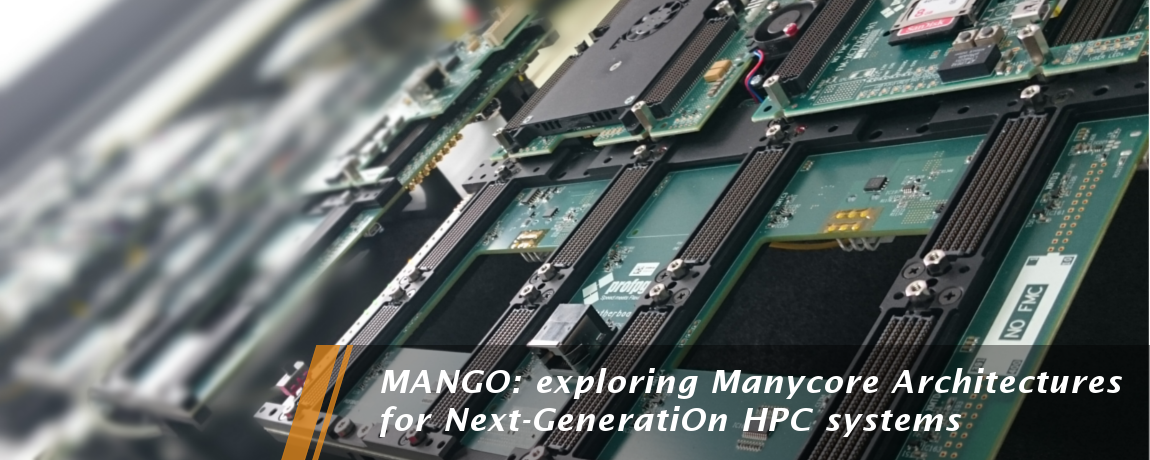Under the H2020 High Performance Computing call (Towards exascale high performance computing) MANGO project was awarded funding of 5.8 million euro for three years of research till October 2018. Coordinated by prof. Jose Flich from University of Valencia, consortium includes École polytechnique fédérale de Lausanne, Politecnico di Milano, University of Zagreb, Centro Regionale Information Communication Technology and industrial partners: Eaton Corporation, Pro Design Electronic GmbH, Thales Group and Philips.
The MANGO (exploring Manycore Architectures for Next-GeneratiOn HPC systems) research project aims at addressing power, performance and predictability (the PPP space) in future High-Performance Computing systems. It starts from the fundamental intuition that effective techniques for all three goals ultimately rely on customization to adapt the computing resources to reach the desired Quality of Service (QoS). From this starting point, MANGO will explore different but interrelated mechanisms at various architectural levels, as well as at the level of the system software. In particular, to explore a new positioning across the PPP space, MANGO will investigate system-wide, holistic, proactive thermal and power management aimed at extreme-scale energy efficiency
The performance/power efficiency wall poses the major challenge faced nowadays by HPC. Looking straight at the heart of the problem, the hurdle to the full exploitation of today computing technologies ultimately lies in the gap between the applications’ demand and the underlying computing architecture: the closer the computing system matches the structure of the application, the most efficiently the available computing power is exploited. Consequently, enabling a deeper customization of architectures to applications is the main pathway towards computation power efficiency.
The MANGO project will build on this consideration and will set inherent architecture-level support for application-based customization as one of its underlying pillars. In addition to mere performance and power-efficiency, it is of paramount importance to meet new nonfunctional requirements posed by emerging classes of applications. In particular, a growing number of HPC applications demand some form of time-predictability, or more generally Quality-of-Service (QoS), particularly in those scenarios where correctness depends on both performance and timing requirements and the failure to meet either of them is critical. Examples of such time-critical application include:
- online video transcoding – the server-side on-the-fly conversion of video contents, which involves very computation-intensive operations on huge amounts of data to be performed within near real-time deadlines.
- medical imaging – characterized by both stringent low-latency requirements and massive computational demand.
Time predictability and QoS, unfortunately, are a relatively unexplored area in HPC. While traditional HPC systems are based on a “the faster, the better” principle, realtimeness is a feature typically found in systems used for mission-critical applications, where timing constraints usually prevail over performance requirements. In such scenarios, the most straightforward way of ensuring isolation and time-predictability is through resource overprovisioning, which is in striking contrast to power/performance optimization.

In fact, predictability, power, and performance appear to be three inherently diverging perspectives on HPC. We collectively refer to this range of tradeoffs, well captured in figure above, as the PPP space. The combined optimization of PPP figures is made even more challenging by new delivery models, such as outsourced and cloud based HPC, which are dramatically widening the amount and the type of HPC demand. In fact, cloud enables resource usage and business model flexibility, but it inherently requires virtualization and large scale capacity computing support, where many unrelated, competing applications with very different workloads are served concurrently.
The essential objective of MANGO is to achieve extreme resource efficiency in future QoS-sensitive HPC through ambitious cross-boundary architecture exploration.
The research will investigate the architectural implications of the emerging requirements of HPC applications, aiming at the definition of new-generation high-performance, power-efficient, deeply heterogeneous architectures with native mechanisms for isolation and quality-of-service.
To achieve such ambitious objectives, MANGO will avoid conservative paths. Instead, its disruptive approach will challenge several basic assumptions, exploring new many-core architectures specifically targeted at HPC. The project will involve many different and deeply interrelated mechanisms at various architectural levels:
- heterogeneous computing cores
- memory architecture
- interconnect
- runtime resource management
- power monitoring and cooling
- programming models
In particular, to gain a system-wide understanding of the deep interplay of mechanisms along the PPP axes, MANGO will explore holistic proactive thermal and power management aimed at energy optimization, creating a hitherto inexistent link between hardware and software effects and involving all layers modeling in HPC server, rack, and datacenter conception.
Ultimately, the combined interplay of the multi-level innovative solutions brought by MANGO will result in a new positioning in the PPP space, ensuring sustainable performance as high as 100 PFLOPS for the realistic levels of power consumption delivered to QoS-sensitive applications in large-scale capacity computing scenarios.
Particularly relevant for current European HPC strategies, the results achieved by the project will provide essential building blocks at the architectural level enabling the full realization of the long-term objectives foreseen by the ETP4HPC strategic research agenda.
Project website: www.mango-project.eu





























































